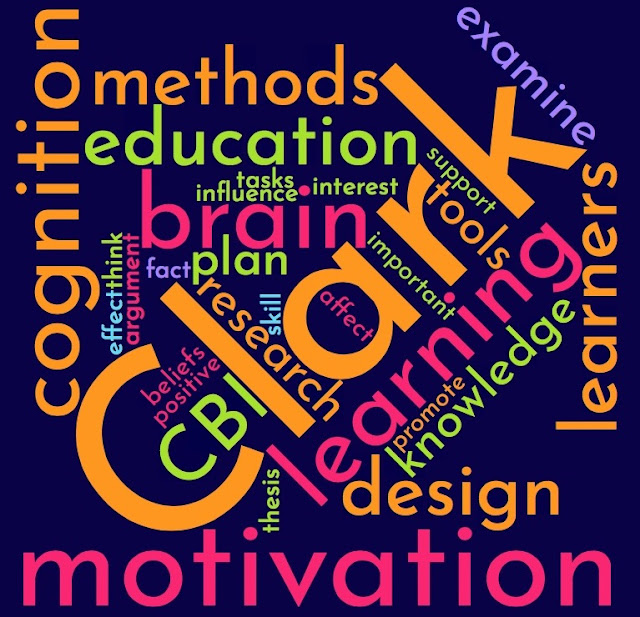Clark and Instructional Media
He also stated that media do not directly influence motivation for learning. I agree that motivation encompasses other factors such as learner beliefs that may be more closely related to motivation for learning. I also think that there are many other factors that are part of, or are affected by, or that affects, motivation. I think that more specific research on media and different aspects of motivation for learning would tell us more about this. I do wonder what recent brain research and research on cognition would reveal.
There is still a lot that we do not understand about the mechanisms and processes through which learning with media occurs (Kozuma, 2012b). Kozuma (2012a) also stated that previous research about the effect of media on learning only considered surface features. Learning processes such as cognitive and affective processes were not explored. For me, this gives rise to questions such as: What are some particular features or functions of media that might affect learning? How do cognitive and affective factors affect learning when using certain media features in the classroom?
Clark and Solomon (2012) suggested that some qualities of media affect cognitions relevant for students with a particular aptitude, learning particular skills/knowledge, as it applies to some types of tasks. I think these authors might be writing about individual differences so specific to each student, that it would be difficult to make generalizations. But I think in terms of research, we can examine general learner characteristics. So one might ask a question such as: How do particular features of media interact with learner characteristics and the method of instruction being used, produce a desired outcome? If we are to take advantage of features that new technologies offer for education in a way that hasn't been possible before, understanding answers to questions like this one is fundamental in designing effective instructional methods.
Personally, I am interested in directions for future research suggested by Clark (2012) about educational technology research related to cognitive motivation theory. He suggested we find more objective ways of measuring cognitive processing, protocols related to cognitive efficiency, and most importantly, have a theory to guide our research.
Clark, R. E. (2012). What is next in the media and methods debate? In R. E. Clark (Ed.). Learning from media: Arguments, analysis, and evidence [Kindle version] (2nd ed., pp. 237-247). Charlotte, NC: Information Age.
Clark, R. E., & Salomon, G. (2012). Why should we expect media to teach anyone anything? In R. E. Clark (Ed.). Learning from media: Arguments, analysis, and evidence [Kindle version] (2nd ed., pp. 37-72). Charlotte, NC: Information Age.
Kozma, R. B. (2012a). Kozma reframes and extends his counter argument. In R. E. Clark (Ed.). Learning from media: Arguments, analysis, and evidence [Kindle version] (2nd ed., pp. 147-166). Charlotte, NC: Information Age.
Kozma, R. B. (2012b). Robert Kozma's counterpoint theory of "learning with media". In R. E. Clark (Ed.). Learning from media: Arguments, analysis, and evidence [Kindle version] (2nd ed., pp. 103-146). Charlotte, NC: Information Age.

Comments
Post a Comment